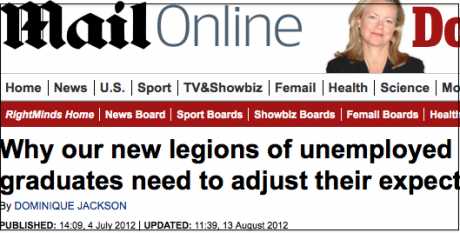As I de-planed at Heathrow some time later, attempting to ignore the ever more perverse HSBC ads that line the jet bridge (the ‘where you see global destruction, we see a new market’ variety now being replaced by ever more absurd and delirious capitalist fantasies such as ‘one day we will all fly organic’) an article in the FT was brought into my view: the High Court had ruled that the workfare scheme was not in violation of the Article 4 rights of Ms. Reilly and Mr. Wilson.
Ms. Reilly and Mr. Wilson had sought judicial review of the Jobseeker’s Allowance (Employment and Enterprise) Regulations 2011, and more specifically, the SBWA (Sector-based Work Academies) and CAP (Community Action Programme) programmes, alleging that these two workfare schemes were ultra vires on a number of grounds, and that in addition, the schemes violated their Article 4 rights under the ECHR.
How is it that compulsory, unpaid labour in order to receive an unemployment benefit does not constitute a violation of Article 4 of the European Convention on Human Rights? Mr. Justice Foskett of the High Court found the following with regard to the Article 4 claim:
“For my part, I do not see any material distinction in principle between Van der Mussele in terms of the matters considered in that case by the Court to render the requirement on the applicant lawful and the schemes or programmes under challenge in the present case: each can be seen as a step towards obtaining eventual employment for the person concerned. But whether that assessment is correct or not, it does have to be said that the sbwa scheme, and indeed the CAP, are a very long way removed from the kind of colonial exploitation of labour that led to the formulation of Article 4. The Convention is, of course, a living instrument, capable of development to meet modern conditions, and views may reasonably differ about the merits of a scheme that requires individuals to ‘work for their benefits’ as a means of assisting them back into the workplace. However, characterising such a scheme as involving or being analogous to ‘slavery’ or ‘forced labour’ seems to me to be a long way from contemporary thinking.” (para 174)
It is interesting, as Rahul Rao notes in a recent blogpost on the Olympic narrative of Great Britain’s historical achievements, to see where and when colonialism is remembered and where it is forgotten. Legal judgments are of course, an enterprising genre for those interested in texts about national identity. This fairly complex judgment is compelling for a number of reasons, but here I want to note how the brief reference to colonialism reveals a moment in which the colonial is made to stand in as a referent against which contemporary British policies and in this case, workfare schemes, are measured. The judgment also reveals a bewildering attachment to a vision of the British state in which the private and public spheres are distinct; so separate in fact, that compulsory labour at the behest of the State, for the benefit of the private sector seems to cast this labour outside of what is currently cognisable by the judge as forced or compulsory labour under Article 4 of the European Convention on Human Rights. Let’s break it down a bit.
Van der Mussele involved a trainee barrister who alleged that compulsory pro bono work violated his Article 4 right. (Yes, the word chutzpah came to my mind too, but putting aside criticisms about the rather wide range of uses to which the ECHR has been put, it is a very interesting read.) The Ordres des avocats in Belgium had rules whereby trainee lawyers would be assigned cases to represent indigent litigants on a pro bono basis. Sometimes, the cases would continue after the pupillage had ended, which was the situation in this instance. The European Court of Human Rights found that no violation of Mr. Van Der Mussele’s Article 4 right had occurred. The Court laid out 2 conditions that must be satisfied in order for an Article 4 claim to be satisfied: 1). The labour must be “performed by the person against his or her will, but either the obligation to carry it out must be ‘unjust’ or ‘oppressive’ or its performance must constitute an ‘unavoidable hardship’, in other words be ‘needlessly distressing’ or ‘somewhat harassing’” (Van der Mussele, para 37). In this case, the Court held that neither of these conditions had been satisfied.
Significantly however, they did find that Mr. Van der Mussele’s consent to perform pro bono work at an earlier stage, upon entering his pupillage three years prior, did not mean that he had consented to each and every assignment of pro bono work subsequent to that (para 36). More broadly, the issue of consent is central to, although not determinative of the claim of forced or compulsory labour. Interestingly, the 29th Report of The House of Lords Select Committee on the Merits of Statutory Instruments considered the workfare Regulations. As noted by Mr. Justice Foskett, the Committee wrote the following in relation to the Explanatory Memorandum provided by the DWP:
“The [Explanatory Memorandum] states that participation in certain elements, for example the Service Academies, is to be by mutual consent, but this does not appear to be borne out by the legislation. DWP explain that ‘this aspect of support and conditionality for customers is not reflected directly in these Regulations because it applies before a Jobseeker’s Allowance recipient is referred to any of the initiatives covered by the Scheme’ (Q7). It is not clear what provision there is to prevent a harsher system being implemented administratively at a later date.”
In this case, the CAP scheme, aimed at the long-term unemployed, is mandatory. The SBWA scheme is voluntary, however, Ms. Reilly was told by her Job Centre Plus Advisor that working at Poundland was mandatory. The sanction in both instances is a loss of benefits.
Putting the questions of voluntariness and consent aside, let’s look at the two reasons for Mr. Justice Foskett’s conclusion that Ms. Reilly’s Article 4 right had not been violated. Unlike Mr. Van der Mussele, it really stretches any reasonable and credible understanding of the nature of her unpaid labour at Poundland to find that this was aiding her in finding employment. Ms. Reilly, a graduate in geology, had made it quite clear that her aspirations lie in working in the Museum sector. Furthermore, and it may seem quite obvious to many people, but there are compelling and persuasive arguments that workfare schemes do not actually assist in getting people back into paid work. The Court seems to have missed an opportunity to evaluate the validity of the workfare schemes as to whether they actually do fulfil this legislative objective.
And to the second basis of the Court’s conclusion: of course a workfare scheme is not the same as slavery. Of course workfare is not the same as indentured labour, or multiple other forms of forced labour that millions endured during colonial rule all over the globe. But how curious it is to import into contemporary human rights jurisprudence colonial slavery as the standard against which any claims to forced or compulsory labour are measured. Engaging in what one might call a peculiar sort of relativism, it becomes impossible to imagine conditions under which a claimant might be successful in an Article 4 claim against the State.
Let’s engage in some speculation. It seems as though there might be two forms of bifurcation at play here, one is the spectre of the racial and its association with ideas of enslavement and free labour. Is unfree, forced or compulsory labour something that can only, in a colonial or imperial imaginary, be associated with black bodies, or alternately, the body of the trafficked woman forced into prostitution? Modern day anti-slavery campaigners focus for the most part on the situation of women (and children) who are trafficked into prostitution or domestic slavery. Successful Article 4 claims have been brought by a Togolese woman who was forced to work for no pay for several years in a household; and a Russian woman forced into prostitution in Cyprus. The latter category, constituted by a particular liberal vision of the powerless victim par excellence, (see Juliette Hua’s excellent work on this topic) also involves a particular kind of racialization of Central and Eastern Europe women. In a colonial, progressivist understanding of history, white indentured labour to the Americas is far in the past, and slavery and conditions of forced labour, and perhaps, simply being in a state of unfreedom is an unfortunate affliction that marks the lives of the ‘global’ poor; but apparently, not the unemployed and poor in the U.K.
The second dichotomy at play reflects a refusal to account for the nexus between public and private spheres. The government has not only dramatically pushed New Labour’s privatisation of basic social welfare provision and education agenda along way forward, but through workfare schemes, provides the private sector with free labour, which despite the radical difference in political configuration, seems somewhat similar in form and effect to an imperial authority forcing people to work for the benefit of private industry.
To add another interesting wrinkle to this tale of exploitation under austerity is the fact that some of the beneficiaries of the workfare scheme are charities, private organisations that are, in what appears as a throwback to the 18th and 19th centuries, increasingly providing social welfare services that are no longer provided for by the state. At the same time, charitable status is benefitting various organisations, such as fee paying independent schools, in ways that are problematic to say the least. The Upper Tribunal decision in AG v The Charities Commission for England and Wales, and the Independent Schools Council of October 2011, which held that fee paying independent schools can have charitable status even though students who cannot afford the fees are clearly precluded from benefitting from all that these schools offer, led to a redefinition of what constitutes a ‘public benefit’ in relation to fee paying charities. In a move that seems to run counter to an increasing reliance on charities to provide social welfare and to run programmes such as the workfare schemes, the Tories have attempted to cap tax relief on charitable donations by rich people, leading W.G. Runciman to conclude, quite simply, that charity law is a mess.
The claims by both Mr. Wilson and Ms. Reilly bring before the court the justness of a workfare scheme that forces thousands of benefit recipients to work for free on penalty of losing their benefits. With housing and disability benefits, legal aid, and a range of other social welfare provisions having been savaged by a government that has also cut thousands of public sector jobs, a sound analysis of the legality of the workfare schemes requires a contextualised analysis of contemporary conditions, not those of the early 20th or late 19th centuries, even though for those benefit recipients who slept under the bridge on the eve of the jubilee celebrations, one might be forgiven for thinking they had somehow slipped far into a past era.
Brenna Bhandar is Lecturer in Law, Queen Mary, University of London.



